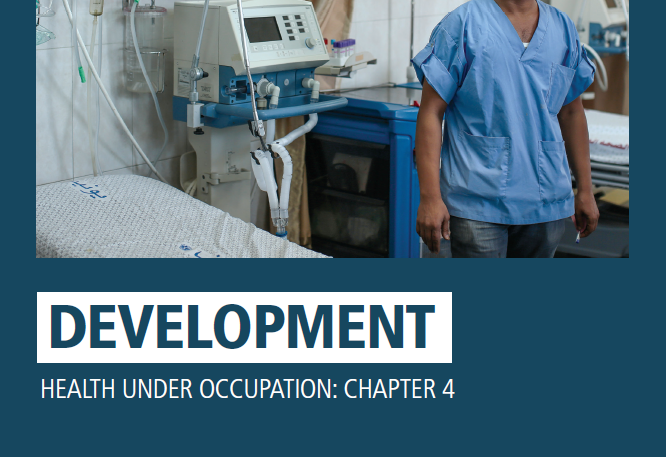New MAP briefing exposes how Israel’s occupation obstructs the development of Palestinian healthcare

Right to Development
As the occupying power, Israel is obligated under international law to respect the Palestinian people’s rights to self-determination and development.
This latest chapter exposes how Israel’s practices and policies are violating these rights and obstructing the development of the health sector in the occupied Palestinian territory (oPt) (Gaza and the West Bank, including East Jerusalem).
Healthcare facilities
Israel’s policies inhibit the construction and maintenance of medical infrastructure and the essential services needed to promote health, particularly water, sanitation and electricity.
In Area C – which represents 60% of the West Bank and where Israel maintains full military and civil control – Palestinians are routinely prevented from building permanent infrastructure. Consequently, there is not a single permanent healthcare centre for approximately 300,000 Palestinians living there.
For half of the 351 Palestinian communities in Area C the closest clinic is more than 30km away. Israelis living in illegal settlements on the same land, however, have access to permanent and modern health facilities.
In Gaza, repeated military offensives have damaged and destroyed healthcare facilities, and their reconstruction has been slowed by Israel’s severe restrictions on the entry of essential building materials.
Health workforce
Restrictions on free movement to different areas of the oPt and abroad limit health workers’ access to training and professional development. Between 2015-2016 there was a 28% decrease in permits issued to Palestinian health workers by Israel to travel through Israeli checkpoints to attend work or training.
In our briefing we illustrate how barriers to movement placed by Israel, Jordan, Egypt and even the UK visa system have all impacted the ability of health professionals in Gaza supported by MAP from being able to travel abroad for training.
Medical materials
Restrictions on access to medical equipment and materials further prevent the development of services in some areas of the oPt.
This is particularly apparent in Gaza, where the blockade’s stifling effect on the economy, ongoing political divisions with the West Bank, and Israel’s restrictions on the import of items it considers to have a ‘dual use’ limit the availability of essential medicines and equipment. Consequently, hospitals and clinics in Gaza have had to deal with constant stock shortages.
Time for action

- Supporting measures aimed at ending the blockade of Gaza and the separation of the West Bank, East Jerusalem and Gaza through bilateral and multilateral engagement;
- Taking steps to reverse the harmful effects on Palestinian health and healthcare caused by the severe fragmentation of the occupied Palestinian territory (oPt) due to settlements, the separation wall and other barriers to movement;
- Supporting the provision and development of essential water, sanitation and electricity infrastructure in Gaza, and demanding that Israel permit entry of all the necessary materials.
- Demanding that Israel, and also Egypt and Jordan, end excessive restrictions on movement for Palestinian health personnel;
- Supporting access to training opportunities for Palestinian health workers in the oPt and abroad, including by facilitating appropriate international visas where necessary; and
- Investing in and/or providing technical support for locally-led, sustainable, affordable and effective healthcare programmes and the development of the Palestinian health sector.
To read the briefing paper, click here.
Earlier this month, Palestinians marked 50 years under occupation, and a decade under blockade in Gaza. Palestinians and people across Britain are calling on the UK government to take action to bring these man-made humanitarian crises to an end.
Related content


